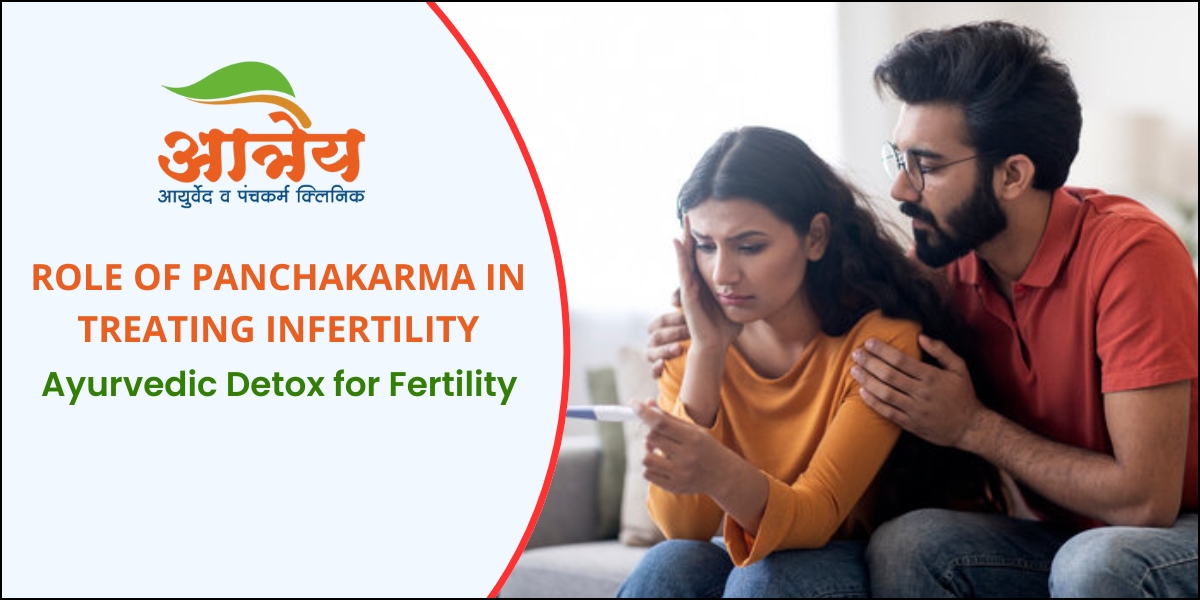Infertility is often not just a reproductive issue—it is a reflection of imbalance in the entire body. In Ayurveda, toxins (ama), weak digestion (agni), and imbalanced doshas can directly affect Ras Dhatu and Shukra Dhatu, leading to difficulty in conception.
Panchakarma, the classical Ayurvedic detox and rejuvenation therapy, plays a crucial role in cleansing the body, balancing hormones, and restoring natural fertility.
Why Panchakarma for Infertility?
- Detoxification of the body – Removes accumulated ama (toxins) that obstruct reproductive channels (artavavaha srotas in women and shukravaha srotas in men).
- Balances doshas – Corrects Vata, Pitta, and Kapha imbalances, which are often root causes of menstrual disorders, PCOS, low sperm count, or poor motility.
- Improves egg and sperm quality – By nourishing Ras and Shukra Dhatu.
- Enhances receptivity of uterus – Prepares the body for conception.
- Reduces stress – Panchakarma therapies calm the nervous system, improving mental health and hormonal balance.
Panchakarma Therapies in Infertility
1. Vamana (Therapeutic Emesis)
- Helps in Kapha-related conditions like PCOS, obesity, or hormonal imbalance.
- Improves metabolism and clears toxins.
2. Virechana (Purgation Therapy)
- Best for Pitta-related disorders like endometriosis, fibroids, irregular cycles.
- Purifies blood and balances hormones.
3. Basti (Medicated Enema)
- Especially effective in Vata imbalance, which is a major cause of infertility.
- Nourishes reproductive tissues and improves ovulation/spermatogenesis.
4. Uttar Basti
- Specialized treatment for infertility.
- Medicated oils/decoctions are introduced into the uterus or bladder for direct action.
- Highly effective for blocked fallopian tubes, endometrial health, and low sperm motility.
5. Nasya
- Clears Kapha and balances hormonal functions through nasal route.
- Improves pituitary and hypothalamic function (HPO axis balance).
When Should Couples Opt for Panchakarma?
- Before planning conception (preconception detox).
- In cases of unexplained infertility.
- For recurrent miscarriages.
- For low sperm count or poor sperm motility.
- In PCOS, irregular cycles, or endometriosis.
Lifestyle & Diet with Panchakarma
Along with therapies, Ayurveda emphasizes:
- Fertility-friendly diet – Fresh, warm, sattvic meals; ghee, milk, dates, nuts.
- Daily Abhyanga – Oil massage to reduce stress and balance Vata.
- Yoga & Pranayama – Especially Bhramari and Anulom Vilom for stress relief.
- Positive mindset – Cultivating calmness and optimism supports fertility.
Best Ayurvedic Panchakarma for Infertility in Pune at Aatreya Clinic
Panchakarma is not just a detox; it is a complete reset for body and mind. By removing toxins, balancing doshas, and rejuvenating reproductive tissues, Panchakarma creates the perfect foundation for conception. Couples struggling with infertility can greatly benefit from a guided Panchakarma program under the supervision of an experienced Ayurvedic physician.
At Aatreya Ayurved Panchakarma & Infertility Clinic in Hadapsar, Pune, we specialize in Ayurvedic solutions for infertility through authentic Panchakarma therapies. Our expert Ayurvedic doctors help couples by detoxifying the body, balancing hormones, improving egg and sperm quality, and enhancing natural fertility. If you are struggling with infertility, PCOS, irregular cycles, or low sperm count in Pune, our personalized Panchakarma treatments provide safe and effective support for conception.
Ayurveda reminds us: A cleansed and balanced body is the best soil for the seed of new life.
Frequently Asked Questions (FAQs)
1. Can Panchakarma really help with infertility?
Yes. Panchakarma helps detoxify the body, balance hormones, and improve reproductive health. By clearing toxins (ama) and restoring dosha balance, it creates a healthy environment for conception.
2. Which Panchakarma therapies are most useful for infertility?
Basti (medicated enema) and Virechana (therapeutic purgation) are especially beneficial. They improve hormonal balance, reproductive tissue (Shukra & Artava Dhatu) health, and uterine cleansing, which supports fertility.
3. Is Panchakarma safe for couples planning pregnancy?
Yes, when done under the guidance of an experienced Ayurvedic doctor. Panchakarma is gentle, natural, and tailored to individual needs. Pre-conception detox is often recommended for both partners.
4. How long does it take to see results with Panchakarma?
Results vary depending on the cause of infertility and individual constitution. Some couples notice improvements in 3–6 months, especially when Panchakarma is combined with Ayurvedic diet, lifestyle, and herbal support.
5. Can Panchakarma be combined with modern fertility treatments?
Yes. Panchakarma can complement IVF or IUI by improving overall health, reducing stress, and enhancing reproductive function naturally. Always consult both your Ayurvedic and allopathic doctors for a combined approach.






